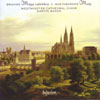Brahms Missa canonica
The ‘German Palestrina’ championed, perhaps a bit too loudly
View record and artist detailsRecord and Artist Details
Composer or Director: Johannes Brahms, Joseph (Gabriel) Rheinberger
Genre:
Vocal
Label: Hyperion
Magazine Review Date: 8/2006
Media Format: CD or Download
Media Runtime: 70
Mastering:
Stereo
DDD
Catalogue Number: CDA67559

Tracks:
| Composition | Artist Credit |
|---|---|
| Missa Canonica |
Johannes Brahms, Composer
Johannes Brahms, Composer Martin Baker, Conductor Matthew Martin, Organ Westminster Cathedral Choir |
| (2) Motets |
Johannes Brahms, Composer
Johannes Brahms, Composer Martin Baker, Conductor Westminster Cathedral Choir |
| Geistliches Lied |
Johannes Brahms, Composer
Johannes Brahms, Composer Martin Baker, Conductor Matthew Martin, Organ Westminster Cathedral Choir |
| Ave Maria |
Johannes Brahms, Composer
Johannes Brahms, Composer Martin Baker, Conductor Matthew Martin, Organ Westminster Cathedral Choir |
| Mass |
Joseph (Gabriel) Rheinberger, Composer
Joseph (Gabriel) Rheinberger, Composer Martin Baker, Conductor Westminster Cathedral Choir |
Author: John Steane
Collectors who file alphabetically under composer will probably make for the Bs with this; but it could well be that when the disc comes down from the shelf it will be for Rheinberger rather than Brahms. The 1878 Mass has a climactic place at the end of this recital, and even after some of the finest of Brahms’s choral works it fully justifies what might have been an invidious position, majestic in concept and masterly in execution.
I’m not sure, however, that I am going to want to hear this recording very often. There’s a stridency about the performance, a too deliberate insistence on energy, too little repose. Are our leading choirs singing much more loudly these days? A few years ago, the choir of Gonville and Caius, Cambridge, recorded the Rheinberger (ASV, 6/97) and, returning to that, I found relief and a better kind of musical pleasure. Westminster are intense, Caius less pressured. They also are better at bringing out a quality in Rheinberger that tends to get overlooked in favour of the skills for which he is sometimes known as the German Palestrina: his lyricism, his remarkable ability to sustain the impression of a continuous singing-line amid so much elaborate polyphony.
Brahms, of course, is the absolute master of concealed polyphony but again I find these performances frequently over-insistent. The stylised syllabic emphasis of the ‘Es ist das Heil’ fugue from the Op 29 motets strikes me as doctrinaire and unnatural compared with the lighter, more flexible styles of St Bride’s (Naxos, 11/99) and the RIAS Choir under Marcus Creed (Harmonia Mundi, 5/96). Westminster do much beautifully (the sublime Geistliches Lied, for instance) and it is good to hear all four sections of the rarely sung Missa canonica. But they bring an alien touch to much else. One will no doubt continue to go to them for Palestrina; not, however for his 19th-century German successors.
I’m not sure, however, that I am going to want to hear this recording very often. There’s a stridency about the performance, a too deliberate insistence on energy, too little repose. Are our leading choirs singing much more loudly these days? A few years ago, the choir of Gonville and Caius, Cambridge, recorded the Rheinberger (ASV, 6/97) and, returning to that, I found relief and a better kind of musical pleasure. Westminster are intense, Caius less pressured. They also are better at bringing out a quality in Rheinberger that tends to get overlooked in favour of the skills for which he is sometimes known as the German Palestrina: his lyricism, his remarkable ability to sustain the impression of a continuous singing-line amid so much elaborate polyphony.
Brahms, of course, is the absolute master of concealed polyphony but again I find these performances frequently over-insistent. The stylised syllabic emphasis of the ‘Es ist das Heil’ fugue from the Op 29 motets strikes me as doctrinaire and unnatural compared with the lighter, more flexible styles of St Bride’s (Naxos, 11/99) and the RIAS Choir under Marcus Creed (Harmonia Mundi, 5/96). Westminster do much beautifully (the sublime Geistliches Lied, for instance) and it is good to hear all four sections of the rarely sung Missa canonica. But they bring an alien touch to much else. One will no doubt continue to go to them for Palestrina; not, however for his 19th-century German successors.
Discover the world's largest classical music catalogue with Presto Music.

Gramophone Digital Club
- Digital Edition
- Digital Archive
- Reviews Database
- Full website access
From £8.75 / month
Subscribe
Gramophone Full Club
- Print Edition
- Digital Edition
- Digital Archive
- Reviews Database
- Full website access
From £11.00 / month
Subscribe
If you are a library, university or other organisation that would be interested in an institutional subscription to Gramophone please click here for further information.




